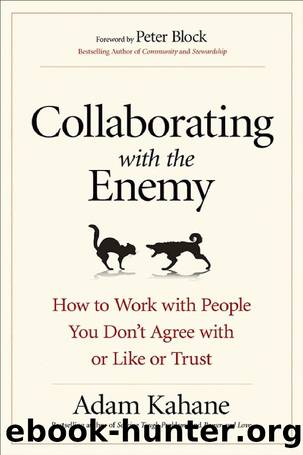Collaborating with the Enemy: How to Work with People You Donât Agree with or Like or Trust by Adam Kahane

Author:Adam Kahane [Kahane, Adam]
Language: eng
Format: epub
Publisher: Berrett-Koehler Publishers
Published: 2017-06-05T06:00:00+00:00
In facilitating collaborative teams, I have made this mistake by focusing on the objectives of the team as a whole and thereby implicitly asking participants to leave their individual and organizational objectives at the door. In doing this, I was also conveniently overlooking the fact that the interests of these larger and smaller wholes were identical only for me and perhaps the team leader: we were the only ones who, when we championed the interests of the whole team, were at the same time championing our own interests.
In 2013, almost thirty years after I left Montreal, I moved back there with my wife, Dorothy, to open the Canadian office of Reos Partners. This gave me the opportunity to see my home with fresh eyes. I found this experience delightful and also puzzling: after many years living in other places, I noticed something distinctive in the low-key way that many of the Canadians I worked with approached the challenges we were dealing with, but I didnât know what to make of it.
The following year, in connection with the upcoming 150th anniversary of Canadaâs founding, my colleagues and I conducted interviews with fifty Canadian leaders. We asked each of them what he or she thought it would take for Canadians to succeed in creating a good future.6
During the period when we were conducting interviews, acrimonious and disturbing debates were taking place in Canada and internationally about the place of Muslims in Western societies. One of the people I interviewed was Jean Charest, a former premier of Quebec, who made a striking comment about the political incentives for enemyfying which foreshadowed the US presidential contest two years later:
Demagogues thrive by cultivating insecurity and demonizing certain groups. They emphasize differences rather than the things we have in common. Human nature is such that we remember negatives better than positives. Itâs easier to vote against somethingâor someoneâthan for it. For politicians, itâs always tempting to pit one group against the other because it works so well and so rapidly.
Then I interviewed Khalil Shariff , the CEO of the Aga Khan Foundation Canada, an organization established by the worldwide spiritual leader of the Shia Ismaili Muslims. Shariff had a thoughtful perspective on Canadian culture that I had never heard before:
In the world as a whole, the notion of homogeneity is quickly disappearing, for two reasons. First, weâre more aware of our individual differencesâour âselfnessââthan ever before. Second, we have experienced demographic movements that historically were unheard of. These two factors mean that the idea of managing difference and being able to live in some kind of common framework might be fundamental for any society today.
Someone once told me that, for an individual, humility is the king of virtues. What is the king of virtues for a societyâthe virtue from which all other virtues and capacities stem? I wonder if the capacity for pluralism might be the source from which all others stem.
If you can build the social capacity to deal with pluralism, then you can deal with a host of other questions.
Download
This site does not store any files on its server. We only index and link to content provided by other sites. Please contact the content providers to delete copyright contents if any and email us, we'll remove relevant links or contents immediately.
Hit Refresh by Satya Nadella(9126)
The Compound Effect by Darren Hardy(8949)
Change Your Questions, Change Your Life by Marilee Adams(7760)
Nudge - Improving Decisions about Health, Wealth, and Happiness by Thaler Sunstein(7693)
The Black Swan by Nassim Nicholas Taleb(7109)
Deep Work by Cal Newport(7066)
Rich Dad Poor Dad by Robert T. Kiyosaki(6612)
Daring Greatly by Brene Brown(6504)
Principles: Life and Work by Ray Dalio(6422)
Playing to Win_ How Strategy Really Works by A.G. Lafley & Roger L. Martin(6247)
Man-made Catastrophes and Risk Information Concealment by Dmitry Chernov & Didier Sornette(6007)
Big Magic: Creative Living Beyond Fear by Elizabeth Gilbert(5756)
Digital Minimalism by Cal Newport;(5750)
The Myth of the Strong Leader by Archie Brown(5500)
The Slight Edge by Jeff Olson(5410)
Discipline Equals Freedom by Jocko Willink(5379)
The Motivation Myth by Jeff Haden(5205)
The Laws of Human Nature by Robert Greene(5173)
Stone's Rules by Roger Stone(5081)
